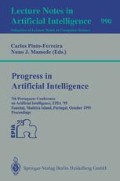Abstract
In this paper we provide a semantic characterization of ground logics, a family of nonmonotonic modal logics obtained by means of a variant of the well known Mc Dermott and Doyle fixed point equation. The term ground logics carries the idea of restricting the negative introspection capabilities of the reasoning agent to the objective (i.e. non modal) part of the theory. This intuition was nicely formalized for modal logic S5 by a semantic definition based on a preference relation on Kripke models, which was obtained as the semantic counterpart to the notion of minimal knowledge initially defined by Halpern and Moses. We have then found a preference relation on Kripke models that both generalizes this notion of minimal knowledge and provides a semantic characterization for a significant subset of ground logics.
Preview
Unable to display preview. Download preview PDF.
References
F. M. Donini, D. Nardi and R. Rosati. Ground Nonmonotonic Modal Logics for Knowledge Representation. To appear in Proceedings of WOCFAI-95.
F. M. Donini, D. Nardi and R. Rosati. Non-first-order features in concept languages. To appear in Proceedings of AI *IA-95 — Fourth congress of the Italian Association for Artificial Intelligence.
J. Halpern and Y. Moses. Towards a theory of knowledge and ignorance: preliminary report. In K. Apt editor, Logics and models of concurrent systems, pages 459–476, Springer-Verlag, 1985.
M. Kaminski. Embedding a default system into nonmonotonic logic. Fundamenta Informaticae, 14:345–354, 1991.
K. Konolige. On the relationship between default and autoepistemic logic. Artificial Intelligence Journal, 35:343–382, 1988.
H. J. Levesque. All I know: a study in autoepistemic logic. Artificial Intelligence, 42:263–310, 1990.
V. Lifschitz. Nonmonotonic databases and epistemic queries. In Proc. of the 12th Int. Joint Conf. on Artificial Intelligence IJCAI-91, Sydney, 1991.
V. Lifschitz. Minimal belief and negation as failure. Artificial Intelligence Journal, 70:53–72, 1994.
F. Lin and Y. Shoham. Epistemic semantics for fixed-point non-monotonic logics. Artificial Intelligence Journal, 57:271–289, 1992.
W. Marek, G.F. Shvarts and M. Truszczyński. Modal nonmonotonic logics: ranges, characterization, computation. In Proceedings of the 2nd international conference on principles of knowledge representation and reasoning (KR-91), pages 395–404, Morgan Kaufmann, 1992.
W. Marek and M. Truszczyński. Autoepistemic logic. Journal of the ACM, 38:588–619, 1991.
V.W. Marek and M. Truszczyński. Nonmonotonic logic. Context-dependent reasoning. Springer-Verlag, 1993.
D. McDermott. Non-monotonic logic II: Non-monotonic modal theories. Journal of the ACM, 29:33–57, 1982.
D. McDermott and J. Doyle. Non-monotonic logic I. Artificial Intelligence Journal. 13:41–72. 1980.
R. C. Moore. Semantical considerations on nonmonotonic logic. Artificial Intelligence Journal, 25:75–94, 1985.
R. Reiter, A Logic for Default Reasoning. Artificial Intelligence Journal, 13:81–132, 1980.
G. Schwarz. Autoepistemic logic of knowledge. In A. Nerode, W. Marek and V.S. Subrahmanian editors, Logic programming and nonmonotonic reasoning, pages 260–274, MIT press, 1991.
G. Schwarz. Minimal model semantics for nonmonotonic modal logics. In Proceedings of LICS-92, pages 34–43, IEEE Computer Society Press, 1992.
G. Schwarz. Bounding introspection in nonmonotonic logics. In Proceedings of the 3rd international conference on principles of knowledge representation and reasoning (KR-92), pages 581–590, Morgan Kaufmann, 1992.
G. Schwarz and M. Truszczyński. Modal logic S4f and the minimal knowledge paradigm. In Proceedings of the Fourth Conference on Theoretical Aspects of Reasoning about Knowledge (TARK-92), pages 184–198, 1992.
G. Schwarz and M. Truszczynski. Minimal knowledge problem: a new approach. Artificial Intelligence Journal, 67:113–141, 1994.
Y. Shoham. Nonmonotonic logics: meaning and utility. In Proc. of the 10th Int. Joint Conf. on Artificial Intelligence IJCAI-87, Milan, 1987.
M. Tiomkin and M. Kaminski. Nonmonotonic default modal logics. In Proceedings of the Third Conference on Theoretical Aspects of Reasoning about Knowledge (TARK-90), pages 73–84, 1990.
M. Truszczyński. Modal interpretations of default logic. In Proc. of the 12th Int. Joint Conf. on Artificial Intelligence IJCAI-91, Sydney, 1991.
Author information
Authors and Affiliations
Editor information
Rights and permissions
Copyright information
© 1995 Springer-Verlag Berlin Heidelberg
About this paper
Cite this paper
Nardi, D., Rosati, R. (1995). A preference semantics for ground nonmonotonic modal logics. In: Pinto-Ferreira, C., Mamede, N.J. (eds) Progress in Artificial Intelligence. EPIA 1995. Lecture Notes in Computer Science, vol 990. Springer, Berlin, Heidelberg. https://doi.org/10.1007/3-540-60428-6_19
Download citation
DOI: https://doi.org/10.1007/3-540-60428-6_19
Published:
Publisher Name: Springer, Berlin, Heidelberg
Print ISBN: 978-3-540-60428-0
Online ISBN: 978-3-540-45595-0
eBook Packages: Springer Book Archive

